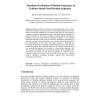Free Online Productivity Tools
i2Speak
i2Symbol
i2OCR
iTex2Img
iWeb2Print
iWeb2Shot
i2Type
iPdf2Split
iPdf2Merge
i2Bopomofo
i2Arabic
i2Style
i2Image
i2PDF
iLatex2Rtf
Sci2ools
132
click to vote
CAISE
2010
Springer
2010
Springer
Situational Evaluation of Method Fragments: An Evidence-Based Goal-Oriented Approach
Despite advances in situational method engineering, many software organizations continue to adopt an ad-hoc mix of method fragments from wellknown development methods such as Scrum or XP, based on their perceived suitability to project or organizational needs. With the increasing availability of empirical evidence on the success or failure of various software development methods and practices under different situational conditions, it now becomes feasible to make this evidence base systematically accessible to practitioners so that they can make informed decisions when creating situational methods for their organizations. In this sense, this paper proposes a framework for evaluating the suitability of candidate method fragments prior to their adoption in software projects. The framework makes use of collected knowledge about how each method fragment can contribute to various project objectives, and what requisite conditions must be met for the fragment to be applicable. Preconstructed ...
CAISE 2010 | Information Technology | Method Fragment | Situational Method | Situational Method Engineering |
| Added | 08 Nov 2010 |
| Updated | 08 Nov 2010 |
| Type | Conference |
| Year | 2010 |
| Where | CAISE |
| Authors | Hesam Chiniforooshan Esfahani, Eric Yu, Jordi Cabot |
Comments (0)

